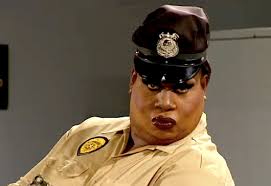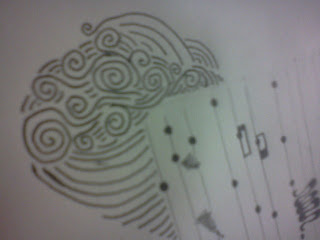...for my Intro to Drama final.
Part one - modern drama. Part two - an interesting character. part three - ...so what?
A formal tone was not required, so I really let my professor have it. Hopefully, he has a similar sense of humor and doesn't fail me....enjoy
Does
20th Century Drama redefine your idea of what theatre is about?
Yes, it does. In particular, the play Six Characters in Search of an Author by Pirandello really
challenged how I thought theatre could be done.
It took my sense of the reality of the stage and turned it upside down.
The notion that characters are their
own creatures and can exist without an author to think them up is
mind-boggling. What is a “character”
then, if not some form of a human’s imagination? As I was reading it, I kept trying to put
things into one concrete reality—were these “characters” simply insane
actors? Was this some sort of joke being
played on the theater company? When the
director started taking them seriously, I couldn’t believe it.
In the end, I just stopped thinking
about it. I suppose that I feel safe in
a world where things are concrete, quantifiable, and easy to understand. Six
Characters showed that there can be multiple realities operating together
on the same stage. Perhaps what made
this play so challenging was the fact that Pirandello never gave an explanation
as to how these characters came to be—if he had said that they were drawn
straight from an author’s brain into flesh and blood by some mystical process,
that would have been easier for me.
But I’m glad he didn’t. Pirandello bends reality and offers the
audience no easy-way-out for us to quantify the experience. I just didn’t know that plays could do that.
Another play that changed and
challenged my views about theatre was Peter Weiss’ Marat-Sade. Though it
existed in a conventional reality, Marat-Sade
challenged how I thought information could be presented. Its aesthetic was disturbing, gritty, and
rough. I have encountered films and
novels with a similar ‘feel’, but I had never thought that this kind of thing
could be done onstage. Theater seemed to
be slightly more sophisticated and refined than that.
Wrong.
Theater can be just as much of a hot
mess as everybody’s favorite cult classic movie—Natural Born Killers, anyone?
I didn’t even consider that that
kind of grungy, dirty aesthetic would work on a stage. That’s kind of foolish of me in retrospect,
but it’s true.
Another thing about that play that
was pretty cool was the amount of incredibly intelligent philosophizing that
was going on amidst the chaos of the asylum.
There were two levels of operation in that play; Sade’s play-within-a-play,
full of heavy discourse about the nature of humanity and heavy political
things, and then the degenerate, ugly mess of the ‘real world’ filled with the
people of the asylum and the Revolution, with anarchy and madness brewing right
below the surface. That’s kind of a
terrifying duality there. That’s
something I’ve never seen thrown into such stark contrast before.

get iiiit? Tony Stark..
anyways.......
Part
2
Eugene, from George Bernard Shaw’s Candida holds great interest for
me. While reading, I wasn’t sure what to
make of him, and now I still have questions.
At first I thought he was some horrifically florid weakling who needed
to grow up a bit and stop talking so much.
When Morrell threatens him with physical violence, he blows things astronomically
out of proportion. I had no respect for
him at all.
I couldn’t take him seriously when he said
more sweet-nothings than a drunken, love-struck Shakespeare-wanna-be. It was like he wasn’t even from planet Earth—to
quote one of my favorite drag queens, Latrice Royale, “Good God! Get a Grip,
Girl”.
 I couldn't resist, there's just so much sass!
I couldn't resist, there's just so much sass!
At that point in my Eugene-experience I
didn’t understand or respect Candida either, so I didn’t see why he would be so
stricken with her. She just seemed like
an airhead, so I couldn’t respect Eugene as a person, and now also, I had no
sympathy with a boy so smitten with such a woman. But either way—airhead or not—Candida is a
married woman, so Eugene should just get over her and go on with his strange,
pathetic little life. I thought it was
so presumptuous and out of line that he was actively and confidently
threatening Morrell.
My view of Eugene started to change for
the better when he exhibited some maturity.
He and Morrell become allies in Act Three right before Candida gets the
truth out of them about their spat earlier that day. There is camaraderie between them, and that I
found very interesting and a rather attractive situation.
When Candida does her speech about how
she chooses her husband over Eugene, saying that Morrell is a weaker man than
Eugene, I had to go back do some re-evaluation.
The points that she brought up about Morrell were excellent and I
realized she wasn’t a servile and dumb creature, but that she actually was the
puppet-master that controlled the domestic world. Candida had won my respect, and therefore
Eugene’s attraction to her was validated.
Maybe Eugene’s poetical nature—which may
mean more than he uses too big of words too often—is the reason he’s so
out-there. When I went back and looked
at some of his lines, I saw the real Shakespeare in the wanna-be. That’s just how Eugene thinks and looks at
the world. He exists in a sort of higher
plane than the rest of the characters, and everything in this plane should
always be lofty and beautiful.
Being a poet is not so much an
occupation as it is a state of mind. And,
as a representative for that state of mind, Eugene does very well. He sees things differently and reacts to them
directly from the heart, which leads to his rather ridiculous emotions. Now that I understand that about him, he
fascinates me.
For one who considers themselves to be
of a somewhat poetical nature (at least in my head) examining a fellow poet is
incredibly intriguing. What does it mean
to “be a poet”? What is this poetical nature I’ve been
talking about? Do I have to be like
Eugene—slightly crazy and overly emotional—to be a proper poet? I’m still working on an answer, but maybe
there isn’t one.
That’s what my Eugene experience has
come to mean.
Now, on to Part Three…
 at this point I just have nothing better to do.
at this point I just have nothing better to do.
Dear
Mom and Dad,
I know college is really expensive, and
sometimes you wonder where your money goes, but I have to say, this
Introduction to Drama class I’m wrapping up is…
Simply smashing, my jolly old
fellows!
No, but seriously, it’s been a
pretty cool and eye-opening class. The
plays we looked at were all very good ones—duh—and they really made me
think. I have a bunch of new things to
draw on for when I want to write my own stuff.
Studying what has come before you is
one of the best ways to learn. Imitation
is what it is I suppose—imitation and modification-so-no-one-knows-you-snagged-it-from-someone-else. That’s what I think art is—a giant form of
collage, where bits and pieces come from a hundred other people’s works that
you’re familiar with, and the artist’s job is to fit them into something coherent
and try to leave your own mark on them.
The more bits and pieces I have to work with the better.
And isn’t that why I’m here? So I can be a better writer? I sure hope so.
That’s how you learn a craft—you’ve
got to watch the masters at it so you know what you’re doing. Apprentice writer. That’s so cool. I guess you never stop being an apprentice
though; you can never be satisfied with what you’re doing, because you can
always do it better.
Okay, now back to this specific
class, I’m a really big fan of the way it is conducted. All we do is pretty much group discussion of
what we think about what went on in the various plays. That’s a nice, refreshing change from High
School. Granted, we did some of that listen-to-your-peers thing
back then, but not nearly as much. It’s
so nice to hear what someone other than the teacher/professor thinks about the
play. There is no wrong or right way to
interpret things—because it’s art. BAM.


And that’s awesome. That’s a very important lesson for an artist
of any medium to learn. If I want to
really be a good artist I’ve got to create things that are specific enough to
get a point across and yet open for wild interpretations. I think that, to get the admiration of the
general public, there’s a ratio of specific to abstract that you have to get
right. If you err on the side of too
specific, you’re going to be boring and meaningless, but if you get too
abstract you’ve confused about half your audience out of giving a damn.
That’s something I think I’ve picked
up on in specifically this class. This
one play we read was just too screwy and mind-boggling for me to get
comfortable with—Six Characters in Search
of an Author, now, it was a good play, but I just couldn’t get into it. It was too abstract for me. I can’t think of a play that got too specific
and too concrete for me—probably because we read plays that were, you know, good.
So I hope you don’t think I’m
blowing your money to just fool around for four years as a last hurrah before I
have to behave like a real adult. Let’s
face it—will I ever be a mature adult?
Nope.
This is an intense learning
phase—I’m here to acquire skills and knowledge that I can use when I’m trying
to make it as a writer in the ‘real world’.
Love,
Your Dashingly Darling Daughter
 that's right. I'm not actually a human being - I'm a dog.
that's right. I'm not actually a human being - I'm a dog.






